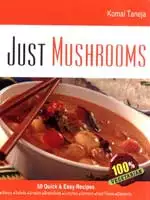|
खाना खजाना >> जस्ट मशरूम्स जस्ट मशरूम्सकोमल तनेजा
|
180 पाठक हैं |
|||||||
जस्ट मशरूम्स
Just Mushrooms
The mush-mush-mushy world of Mushrooms is fairly big enough to create
versatile and delightful preparations with healthy and nutritious
methods of cooking Mushrooms. Simmers’ food tag is kept
intact.
Thus, just cook it up with Mushrooms and enjoy the complete range of
novel Mushroom recipes like- Mushrooms & Jackfruit Sizzler,
Cheesy
Mushroom Quesadillas, Mushroom Zero Oil Pao Bhaji, Mushroom-Zucchini
Kebabs and more.
BRIEF HISTORY
The culinary use of the mushroom is of ancient origin. The edible
mushroom has been a part and parcel of Southeast Asian cuisine or diet
for thousands of years. Ancient Egyptians called it the edible fungi
and in India they are found in the hilly areas of Himachal , Kashmir
and sikkim. The British Raj also cultivated mushroom and it was a
delicacy served in western cuisines. The Chinese are ardent lovers of
shitake mushroom. The Japanese and Thai also relish mushroom and eat a
number of varieties in their cuisines. The Italians also include
mushroom in combination with pasta.
We, Indians, call it Dhingri , the white mushroom used in north Indian cooking- mushroom Malai matter, mushroom masala and mushroom Biryani etc. The Nepalese also have great interest in cooking mushroom in their own distinctive style. Now a days mushroom is used extensively and globally all over the world for multi-cuisine preparation because of its high water content no fat, no cholesterol and no sodium composition. The cultivation and consumption of edible mushroom is increasing in today’s world.
We, Indians, call it Dhingri , the white mushroom used in north Indian cooking- mushroom Malai matter, mushroom masala and mushroom Biryani etc. The Nepalese also have great interest in cooking mushroom in their own distinctive style. Now a days mushroom is used extensively and globally all over the world for multi-cuisine preparation because of its high water content no fat, no cholesterol and no sodium composition. The cultivation and consumption of edible mushroom is increasing in today’s world.
MEANING AND STRUCTURE
The word ‘mushroom’ is derived from (Mousseron)
meaning
moss. As mango is the fruit of mango tree, similarly mushroom is the
fruiting body of a fungus. A typical mushroom consists of a shaft and a
cap. The under side of the cap is fitted with gills or lamellae where
actual spores are produced.
In a broader sense, mushroom means any visible fungus or fruiting body of any fungus with the mycelium (thread like filaments) usually hidden under the bark of the tree, underground or rotten wood or leaves. Mushroom obtains its food through decomposition. As green plants make food by photosynthesis using sunlight to produce energy and food, the mushroom derives its nutrient from dead organic matter.
In a broader sense, mushroom means any visible fungus or fruiting body of any fungus with the mycelium (thread like filaments) usually hidden under the bark of the tree, underground or rotten wood or leaves. Mushroom obtains its food through decomposition. As green plants make food by photosynthesis using sunlight to produce energy and food, the mushroom derives its nutrient from dead organic matter.
|
|||||
अन्य पुस्तकें
लोगों की राय
No reviews for this book


 i
i 










